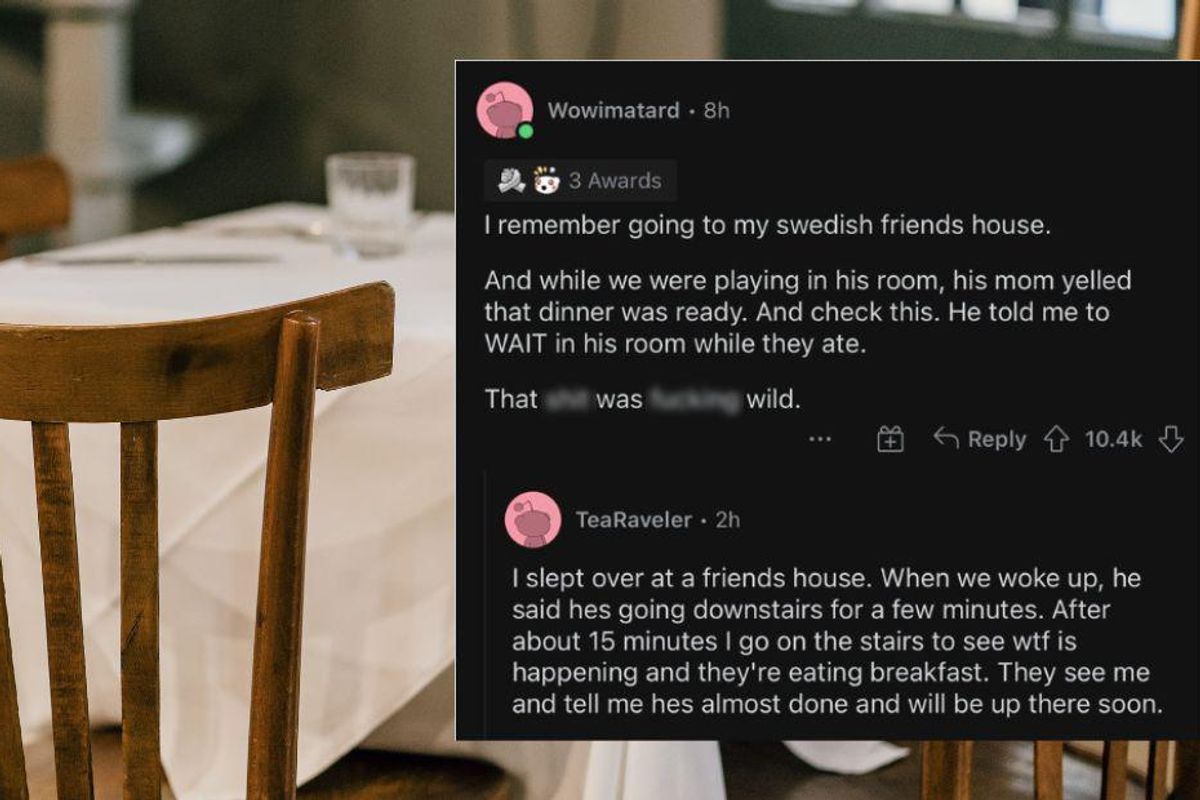The Swedish resistance to feeding guests may not actually be as rude as it seems
A viral post about Swedish households excluding guests from meals created a flurry of debate over cultural norms.

Sweden's cultural norm of not feeding unexpected guests resulted in a flurry of debate over hospitality.
Growing up, I was taught that it was rude to slurp food at the dinner table. In most American households, if you ate a bowl of soup and audibly slurped the noodles out of your bowl, people would assume you never learned proper table manners.
As an adult, though, I lived in Japan for a year, where it is not only acceptable to slurp your noodles loudly around others, but it's actually considered good manners. Noodle slurping is an integral part of Japanese food culture, a norm that feels strange or even wrong to people from most other cultures.
This difference was the first thing that came to mind when I saw a flurry of debate recently about a Swedish cultural food norm that some people find downright appalling.
It all started with a viral Reddit post asking about the weirdest thing people have had to do in someone's home due to their culture or religion. One responder described being made to wait in a Swedish friend's bedroom while the friend had dinner with their family.
"While we were playing in his room, his mom yelled that dinner was ready. And check this. He told me to WAIT in his room while they ate," the person wrote.
Another comment followed describing a similar instance: "I slept over at a friend's house. When we woke up, he said he's going downstairs for a few minutes. After about 15 minutes I go on the stairs to see wtf is happening and they're eating breakfast. They see me and tell me he's almost done and will be up there soon."
\u201cNot here to judge but I don\u2019t understand this. How\u2019re you going to eat without inviting your friend?\u201d— Seeker (@Seeker) 1653584083
Fast and furious responses followed, screenshots of the posts went viral on various social media platforms and the entire nation of Sweden took a beating as people berated their rude habits and lack of basic hospitality. The hashtag #Swedengate trended on Twitter for days as people shared all manner of negative impressions of (and in some cases, direct experiences from) Swedish culture.
I'm not here to defend Sweden wholesale, as I'm sure there are plenty of legitimate criticisms, as there are for every culture. However, when it comes to something like not feeding guests in your own home, it seems likely that there's some kind of explanation beyond "these people are just rude." Much like noodle slurping in Japan, one culture's rude can be another culture's polite.
As it turns out, there are a few explanations for it.
Part of Sweden's food culture is a combo of its long winters and culture of independence.
Professor Hakan Jonsson, a food studies professor at Lund University in Sweden, told The New York Times that some of the resistance to feeding guests stems from the days when food harvests had to be stored for many months during the long Nordic winter. Spontaneous dinners were traditionally not part of the culture, as families had to carefully plan and ration their food stores.
Independence is also a strong cultural value in Sweden, and rather than seen as generosity, feeding another person's child could be seen as a criticism of that family's ability to provide for their children.
“There has been a very strong urge of independence, to not rely on others’ good will for having a good and independent life,” Professor Jonsson told The Times.
(Hmm, now the entire IKEA model makes sense. Careful precision in design, but then, "Here, you're on your own to actually build it. Good luck.")
\u201c@savehansson @WallySierk Nordic/Germanic/Celt ancestry here. My mother, horrified at my neighbor's attempts to feed me, safety-pinned a note to my clothes saying "please do not feed _______, she gets enough food at home." Their (weird) assumption was that neighbors were throwing shade.\n\nNow I get it.\u201d— Incompent Beneficiary of Nepotism (@Incompent Beneficiary of Nepotism) 1653843493
Others have shared similar explanations, saying that feeding someone else's child is in some ways considered rude, either because it's viewed as a judgment on the parents' ability to feed their children or as interfering with a family's own dinner.
"Swedes cook for the people they expect (family). Precise portions. We don't mind guests, just tell us in advance and we'll add one more. And in Sweden, it's understood, you don't eat at a friend's house unannounced. No big deal here," wrote one Twitter user.
Those explanations didn't stop people from cultures that place a high value on hospitality from criticizing the practice, of course. Not feeding a guest in your home is the peak of rudeness in certain cultures, so how could this practice be seen as OK in any way?
Part of Sweden's not-feeding-guests culture may be rooted in a history of shame for 'owing' people.
\u201cThis is blowing people\u2019s minds, so as an amateur historian and sociologist I\u2019m going to try to explain this development/ cultural artifact.\u201d— Incompent Beneficiary of Nepotism (@Incompent Beneficiary of Nepotism) 1653843493
Another explanation shared on Twitter from an "amateur historian and sociologist" provides more historical context for the practice. It's a bit lengthy, but the gist is that this not-feeding norm isn't unique to Sweden, but common to Norse cultures in general and even somewhat common in Norman England and France. According to this explanation, it has to do with the historical "honor/shame economy" of Viking culture being a source of violent conflict.
"In Norse culture, hospitality (providing food, drink, lodging) was a duty of higher status individuals towards people of lower status, but the act of receiving hospitality created an obligation or debt on the part of the recipient," @WallySierk wrote. "So, hospitality not only brought honor to the giver, it had the potential to bring shame to the recipient. Norse culture, and as it progressed through the Middle Ages, was incredibly personally violent. People fought duels, violently extracted debts and squeezed renters."
"One of the challenges of the Protestant church in Scandinavia post-30 years war was to create a culture that tamped down on personal violence and civic unrest," they continued. "Since the root of a lot of the interpersonal violence was competition for status and extraction of payment, the Church, with the framing of early Protestant Humanists, began to promote the ideal of the free member of society, owing no one and owed nothing. If the culture could get rid of the interactions that caused friction, people could live more peaceful lives."
The thread explains that inequality and industrialization in the 1700s and early 1800s pushed Scandinavians to emigrate to America and other colonies, leading some people in power to manipulate debts, which created a lot of pain.
"When people were able to escape debt, they felt a lot better. So, for the sake of egalitarianism and reduction of conflict, they created a society that minimized the creation of debt and obligation, and maximized the ability of the individual/family to be self-sufficient. This 'not feeding the neighbor kids' weirdness Is about maintaining peace in the community."
\u201cInterpersonal conflict and maintaining civic peace. I personally think it needs to be moderated in order for people to live healthy complete lives, but I hope that the revulsion that many people were expressing will be tempered by understanding the source of it.\u201d— Incompent Beneficiary of Nepotism (@Incompent Beneficiary of Nepotism) 1653843493
From reading replies from Swedes, it appears this practice is common, but not necessarily universal. It also appears to be primarily about guests who are not planned for in advance, not a blanket "we don't do hospitality" norm. Still, it is a stark contrast to cultures in which offering food to any guest in your home is simply par for the course. The idea that you would not only not offer, but actively not serve a guest food is a complete anathema in many countries and cultures around the world.
But when you dig into the roots of why those norms exist, it's not quite as blatantly rude as it seems. Cultural norms rooted in historical struggle take a long time to change, even when those struggles are no longer front and center.
All I'm saying is let's give the Swedes a teensy bit of grace on the food front. They may come across as stingy to many of us, but in the context of their own history, it makes some sense. Plus those IKEA Swedish meatballs are hard to beat.
This article originally appeared on 6.3.22
- A hilarious commercial in Sweden is getting people hyped about ... ›
- Sweden's parental leave laws have revolutionized the lives of moms ... ›
- Sweden is really good at gender equality. This kindergarten is an ... ›
- American Airlines pilot berates 'rude' passengers - Upworthy ›
- People share ways they use leftover ingredients for meals - Upworthy ›
- Man compares wife greeting guests with her 10 minutes before - Upworthy ›
- Teachers share 9 ways to stop kids from being rude - Upworthy ›
- Gen Xers and boomers share good manners we should bring back - Upworthy ›
- The weirdest food combos that people are saying are in fact delicious - Upworthy ›
- How dad got his son to use 'please' and 'thank you' with made-up cat story - Upworthy ›
- Doorbell camera captures little boy's adorable rant about his mom's nightly chicken dinners - Upworthy ›
- Why people become curmudgeons and how to fight their negativity - Upworthy ›
- Chef surprises Zimbabwean friend with food from his homeland—and ends up in tears - Upworthy ›
- Non-Americans share 15 things that left them utterly bewildered when they visited America - Upworthy ›
- Scientist demonstrates the bizarre, explosive method used to determine calories in food - Upworthy ›
- Non-Americans share completely normal things in their country that would 'shock' Americans - Upworthy ›
- Sweden makes epic proposal to Switzerland to end confusion - Upworthy ›
- Etiquette rule solves the 'eat when it's hot' or when 'all are served' debate - Upworthy ›



 In a 4-day model, kids often (but not always) receive less instructional time. Photo by
In a 4-day model, kids often (but not always) receive less instructional time. Photo by 
 Xennial woman with her Boomer
Xennial woman with her Boomer  A Xennial son spends time with his Baby Boomer parent.
A Xennial son spends time with his Baby Boomer parent. A Xennial son goofs around with his Baby Boomer dad.
A Xennial son goofs around with his Baby Boomer dad.

 A modern bathroom. Photo by
A modern bathroom. Photo by 
 Kendrick Constant photoshops himself into a group photo. Photo Credit: Kendrick Constant
Kendrick Constant photoshops himself into a group photo. Photo Credit: Kendrick Constant Kendrick Constant has dinner with his friend Beck.Photo Credit: Kendrick Constant
Kendrick Constant has dinner with his friend Beck.Photo Credit: Kendrick Constant